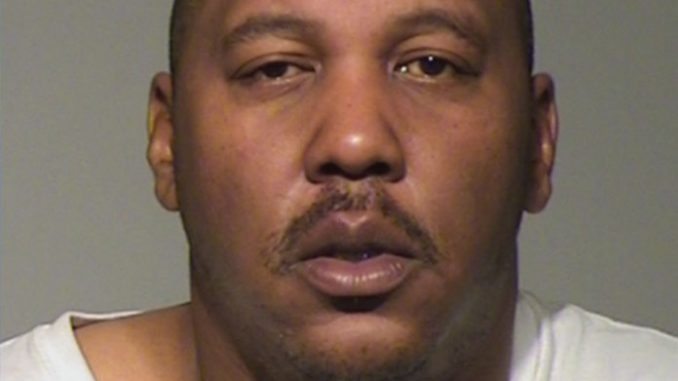
An inmate at the Milwaukee County Jail died of dehydration and his death ruled a homicide after jailers denied him water for a few days.
He died of “profound dehydration” in April.
The man’s water supply was cut off for six days because of his misbehavior.

BYPASS THE CENSORS
Sign up to get unfiltered news delivered straight to your inbox.
You can unsubscribe any time. By subscribing you agree to our Terms of Use
Latest Video
He died begging for some water, according to other inmates.
The Journal Sentinel reports:
The cause of death was dehydration, with other significant conditions including bipolar disorder, according to autopsy results released Thursday by the Milwaukee County medical examiner’s office.
Terrill Thomas, 38, was found unresponsive in his cell on April 24, nine days after being arrested for shooting a man in the chest and later firing two shots in the Potawatomi casino.
His family said he was in the throes of a mental breakdown when he was arrested. At the time of his death, he was awaiting a court-ordered psychiatric examination.
In July, the Journal Sentinel reported that inmates in cells near Thomas heard him beg for water days before his death and saw the water faucet in his cell had been shut off. Police investigating Thomas’ death then interviewed the inmates.
The water in Thomas’ cell had been shut off for six days, according to the inmates. They said corrections officers told them his water was turned off because he had been flooding his previous cell and was acting erratically.
Testing after Thomas died revealed “profound dehydration,” according to the medical examiner’s office.
The county jail is overseen by the Milwaukee County Sheriff’s Office. Sheriff David A. Clarke Jr. did not respond to a request for comment. A statement issued by his office Thursday afternoon said there would be no comment or internal investigation of employees until all outside reviews and investigations were completed, including civil lawsuits that could be filed by the inmate’s family.
The homicide ruling does not necessarily mean a crime was committed or that the district attorney’s office will press criminal charges against any County Jail employees. The medical examiner uses the term “homicide” to denote a death “at the hands of another.” Should the case be criminally prosecuted, the district attorney’s office would need to prove an intent to kill or a reckless disregard for life.
The district attorney’s office declined to comment on whether it will press charges.
Thomas’ family had struggled to get information on why or how he died. For his parents, Celia and T.J. Thomas, the autopsy results confirmed what they feared and provided closure after months of waiting. But they can’t accept how their son died.
“Why would you put a person that messed up in jail?” Celia Thomas said. “He shouldn’t have been there in the first place. He should have been in a mental complex.”
Not only did he spend his final days waiting for a mental examination, she said, but he was asking for water.
“They could have gave him some water,” she said.
Tiffany Robertson, Thomas’ cousin, said the family will feel little relief until the Sheriff’s Office has reviewed its policies and procedures to ensure another inmate doesn’t die this way.
“I never want another family to have to feel like what we feel like right now,” she said.
Robertson said the family is exploring their legal options with a lawyer. The family could sue for damages through a civil suit regardless of whether criminal charges are pressed or whether someone is disciplined or convicted.
One of the inmates, Marcus Berry, said he repeatedly urged corrections officers to give Thomas water the day before he died. Berry was in a cell across from Thomas the last six days of Thomas’ life.
The tap water in Thomas’ cell was shut off the day he was brought to the segregation unit, Berry said; those taps are inmates’ primary source of drinking water. Berry said a corrections officer told him the water was shut off because of Thomas’ erratic behavior in his previous cell.
He said Thomas was also refusing food.
“I could tell he was getting weaker,” Berry said. “One day he just lay down, dehydrated and hungry.” When Berry asked if Thomas needed water, he said it sounded like Thomas tried to say “yeah” but couldn’t fully speak.
Before going to bed that night, Berry said he told a corrections officer: “If something happens to that man, it’s your fault.”
He woke up hours later when corrections officers discovered Thomas unresponsive. Corrections officers told police soon after he died that they had been checking on Thomas every 30 minutes and he had made some type of noise or movement every other time.
Berry and another inmate interviewed by the Journal Sentinel, Alexander Cambronero, were not interviewed by Milwaukee Police Department investigators looking into the death until after the Journal Sentinel published a story including Berry’s account.
The district attorney requested Milwaukee police conduct an investigation of the death immediately following Thomas’ death. That investigation should be completed in the next few days, according to police spokesman Sgt. Timothy Gauerke.
On Aug. 28, a 38-year-old female inmate was found dead in the County Jail. Details of her death have not yet been made public.
A 2014 Milwaukee Journal Sentinel investigation found 10 people died in custody of the Sheriff’s Office during a four-year period. One woman complained of chest pains but didn’t get proper medical care, one man’s water had been shut off and one man committed suicide after not receiving his prescribed anti-depressants. None of those deaths resulted in charges against personnel; only two resulted in officers being disciplined.


